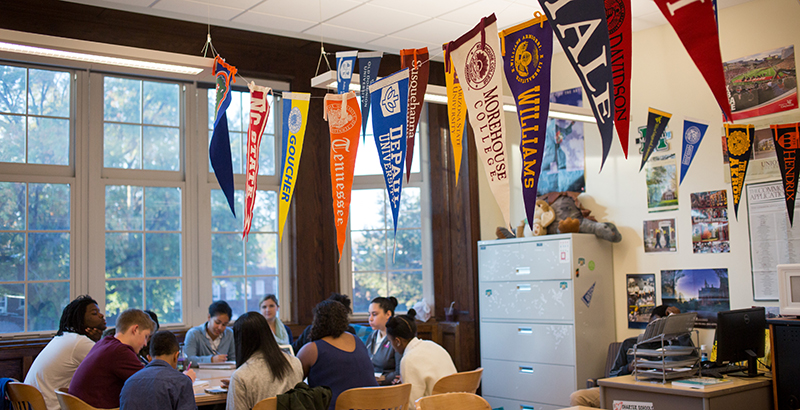Study: Students Who Attend Charter High School More Likely to Vote, Less Likely to Commit Crime

Researchers attempting to gauge the success of charter schools tend to focus on hard academic metrics: proficiency in fourth-grade reading, for example, or test scores in eighth-grade math, and achievement gaps between white and minority students.
But a recent study attempts to broaden that conversation, tracing charter schools’ effects beyond the classroom to issues such as voting and criminal behavior.
The study, released in June, found that eighth-grade students in traditional public schools in North Carolina who transitioned to a charter high school had more positive behavioral outcomes than their peers who went on to a district high school.
The students who transitioned to a charter high school from a traditional public school were less likely to be chronically absent or suspended during their freshman year. In high school and beyond, these students were also less likely to be convicted of a crime, and once they reached voting age, they registered to vote and voted in local, state and federal elections at higher rates.
The findings are part of a working paper published by the Annenberg Institute at Brown University by four researchers — two from the University of North Carolina at Chapel Hill and two from the RAND Corporation. While the paper is still being peer-reviewed and is thus subject to change, the researchers predicted that any modifications would likely be minor. Co-author Doug Lauen of the University of North Carolina called the results “preliminary and potentially tantalizing.”
“If we have an effective education system, whether it’s in the traditional public school sector or the charter school sector, we want to know if it’s lowered kids’ chances of being convicted of a crime,” he said. “We also want kids to vote. These are important civic outcomes.”
The study focused on more than 20,000 students who attended 35 high schools between the 2004-05 and 2010-11 school years. Researchers compared school data on student conduct and attendance with publicly available criminal and voting data through 2016. They excluded certain charter schools — such as Grandfather Academy, which serves students who have experienced emotional, sexual or other abuse — because they didn’t think it would be fair to compare them with traditional public schools. Similarly, they didn’t include traditional public schools located in hospitals or prisons.
Unlike some charter school studies, which compare the performance of students admitted in a lottery with those not chosen, this research employed a matching approach. The researchers paired eighth-grade students with similar demographic profiles and who were therefore just as likely to choose a charter high school. The researchers then tracked the behavior for thousands of these pairs of students to see whether and how they diverged.
Results for students who transitioned from a traditional public school to a charter school high school were consistently positive (by as much as 5.5 percentage points), but the outcomes for students who stayed in the charter system were more mixed. (While reluctant to speculate about the reasons for these differences, the researchers hypothesized that students who were already in charter schools may have previously experienced a short-term boost in their behavior, leading to fewer noticeable changes between eighth and ninth grade.) Of the racial and ethnic subgroups the researchers studied, Latino students experienced the largest gains from attending a charter high school.
The study’s scope is broad but not deep, and the researchers did not dig into the school-level factors that might have led to these outcomes. Data limitations also kept researchers from examining whether parents’ voting or criminal behavior affected their children’s actions.
The researchers believe their study’s focus breaks new ground, and Lauen said he hopes more education researchers will look to the broader effects schools can have, such as involvement in the justice system.
“We give a lot of lip service to the broader goals of schooling,” he said. “People complain that schooling has become just about test scores. Well, great, let’s do something about that. Let’s look at civic outcomes. Let’s responsibly link these data so we can serve the public interest.”
Disclosure: The Walton Family Foundation, which funded the study, also provides financial support to The 74.
Get stories like these delivered straight to your inbox. Sign up for The 74 Newsletter

;)